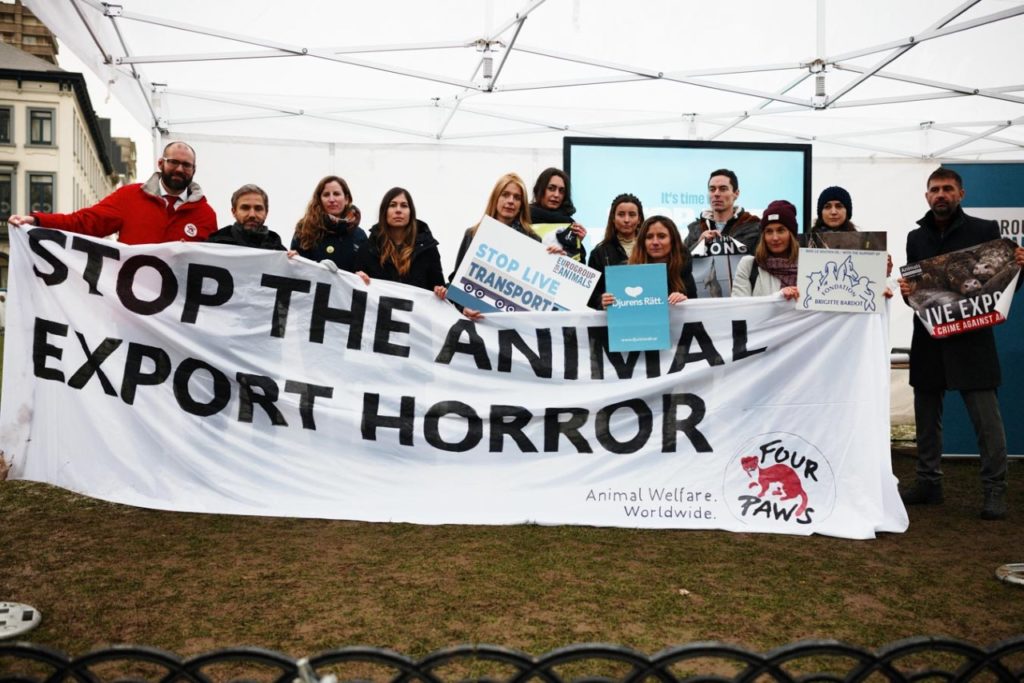The vote in the European Parliament on Thursday on live animal transports over long distances and live export did not meet the expectations of NGOs after a protest action together with MEPs.
Ahead of the vote, the NGOs organised a protest action together with MEPs in front of the European Parliament. For the past year, the Parliamentary Committee of Inquiry on the Protection of Animals during Transport (ANIT) has analysed the implementation of EU rules by member states and the correct enforcement by the European Commission.
Eurogroup for Animals described the Committee vote as a missed opportunity. Despite some positive calls for improvement, the final report’s text, as adopted, fails to address the bulk of the problems, calling for minor improvements rather than supporting a systemic change.
“Despite some good wording on meat and carcasses trade, the committee did not make any call to ban live export,” commented CEO Reineke Hameleers. “This is very disappointing, given the evidence the same committee collected through hearings, field missions and workshops with experts in the field, and to severe accidents at sea which happened during its mandate.”
A sustainable Europe, in line with the EU Farm to Fork strategy cannot be implemented if long-distance transports are improved rather than banned, and if we continue to allow for the transport of young and pregnant animals over 40% of the pregnancy stage, she added.
Compassion in World Farming EU called on the European Parliament to go beyond the weak recommendations from the committee and vote for strict limits on live animal transport, including an outright ban on live exports to outside the European Union.
“These recommendations fall far short of the measures needed to end the abject suffering millions of farmed animals have to endure on the often-long journeys to where they are to be fattened or slaughtered,” commented Olga Kikou, head of the NGO.
“This suffering is inherent in the current regime governing live animal transport, both within and outside the EU, because the rules are too lax and often poorly enforced by governments. Animals are sentient beings that feel stress, fear and pain, not inanimate objects to be trucked around like furniture or cabbages.”
“Journeys by road and/or sea are particularly long and stressful to countries such as Turkey, Lebanon, Libya and Algeria which are considered high-risk for animal welfare, she added. “Cases of tremendous cruelty in third countries are commonplace but it is impossible for the EU to enforce its animal protection legislation beyond its borders. Hence the need for live exports to stop.”
FOUR PAWS called on the Parliament to strengthen the committee recommendations when it discusses them in plenary in January next year. Tragedies during animal transport at sea are sadly not an exception but a regular occurrence.
“The amendments include demands for a ban on transport for unweaned animals younger than five weeks and pregnant animals in the last third of gestation, as well as a limit of eight hours for transport to slaughter,” commented Pierre Sultana, Director of the European policy Office at FOUR PAWS. “This is a step in the right direction, but many important points are still missing.”
“While we agree with some of the included points and were delighted to see the addition of today’s amendments, we do not think that the documents are going far enough,” he added. ”What we need is a ban of live animal exports and of all transports via sea as well as a limit of the journey time of all transports to eight hours.”
The NGOs hope that the European Parliament at its plenary meeting will address the shortcomings in the committee vote yesterday (2 December).
Political majority for tightening the rules?
“Yesterday's vote shows that there may be a political majority in the European Parliament that is behind the introduction of a tightening of EU legislation on animal transport,” MEP Pär Holmgren, (Greens/EFA) told The Brussels Times.
“The current regulations are outdated, and contain many exceptions and loopholes. We have countless pieces of evidence that the EU's policy on animal transport is insufficient and needs to be fundamentally changed.”
“The outcome in the committee was very even. I’m glad that we will have another chance in January when the whole European Parliament takes a position on this resolution. The Green Group agrees on these issues. Several of the other groups, on the other hand, are divided.”
Should the decision be seen as a compromise that has the greatest chance of going through when the whole parliament will vote on it?
“No, I find it difficult to see yesterday's vote as advisory in any direction. The votes were so even. But it shows that there may be a political majority for stricter legislation. I see the vote in January as a new opportunity.”
What do you want to highlight as the most important improvement in the vote?
“It’s positive that the committee now notes that EU animal transport is unsustainable. It’s also good that the committee is behind a total ban on the transport of the smallest animals, younger than 5 weeks.”
M. Apelblat
The Brussels Times

